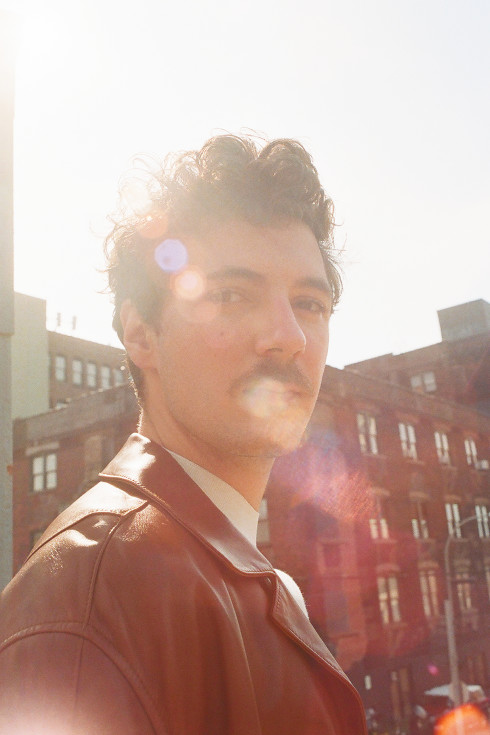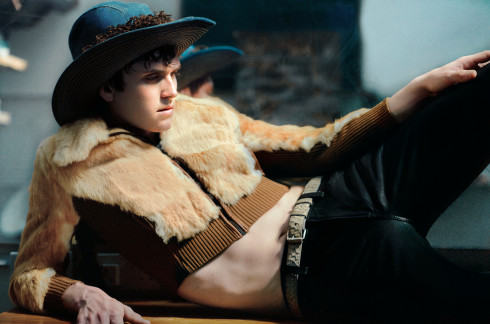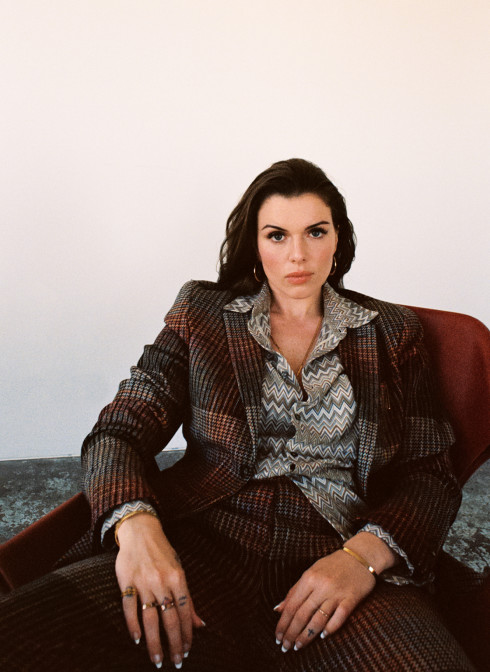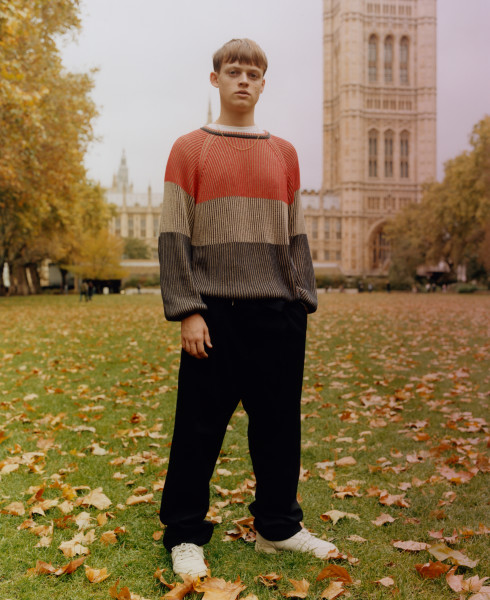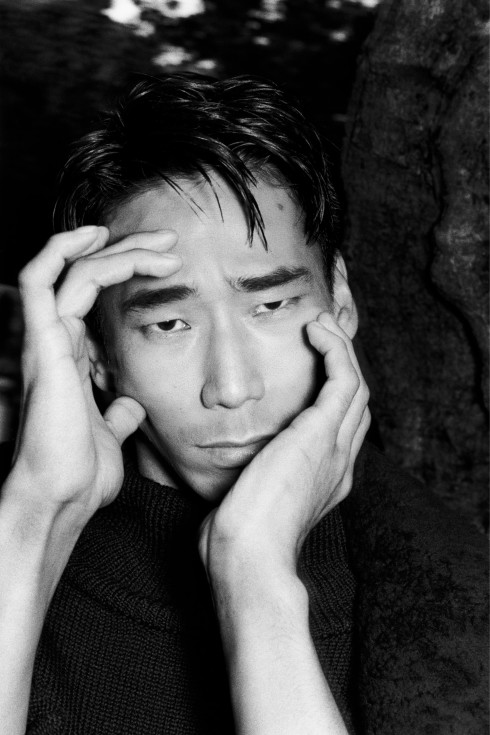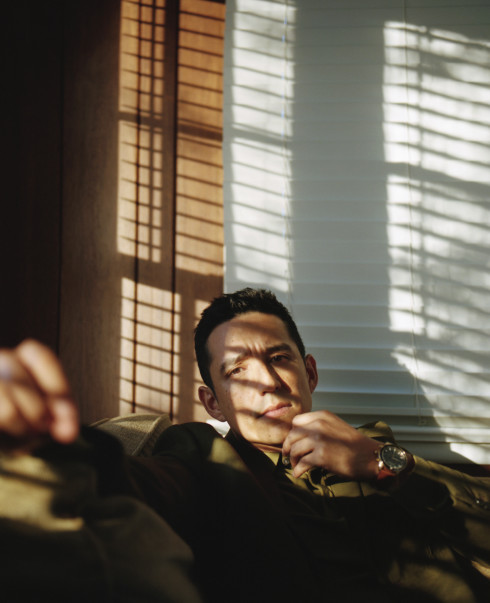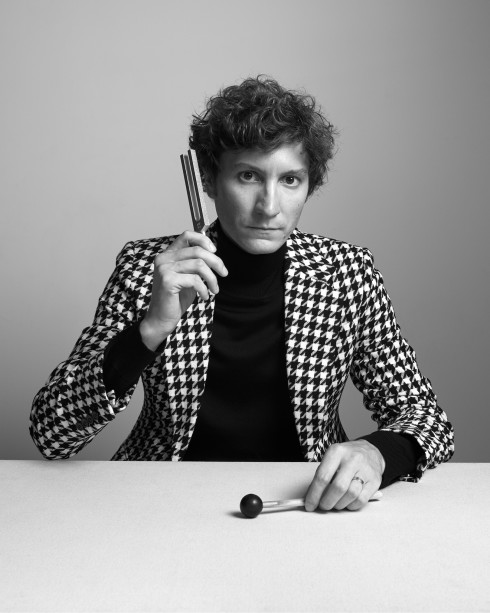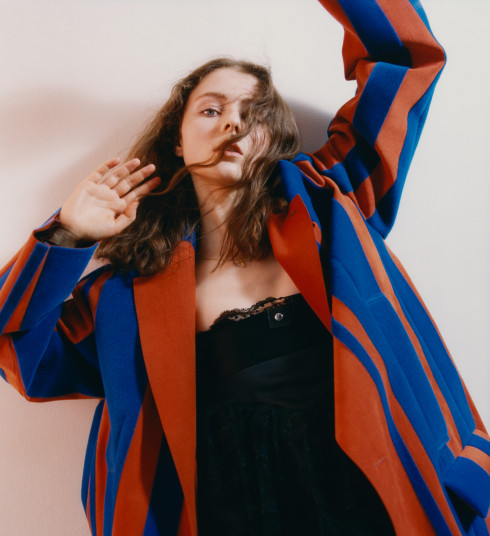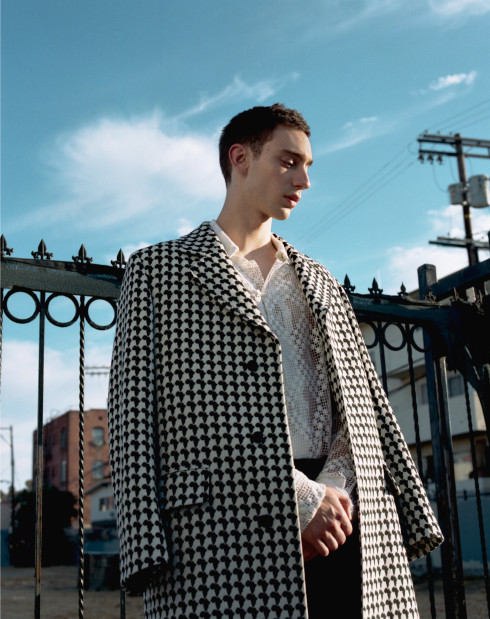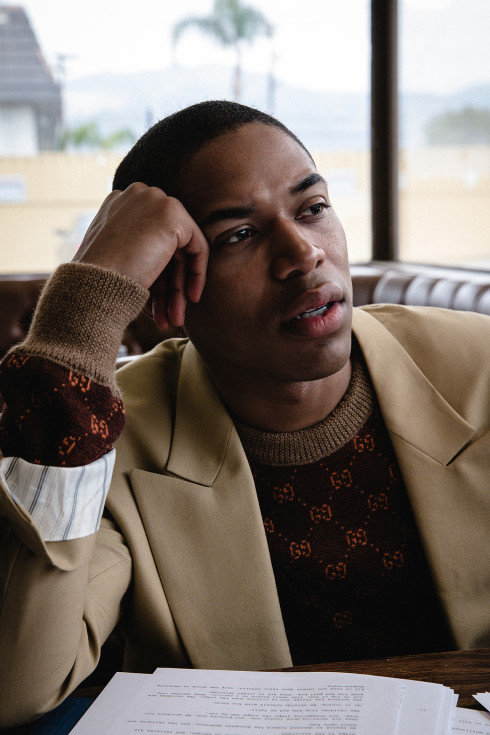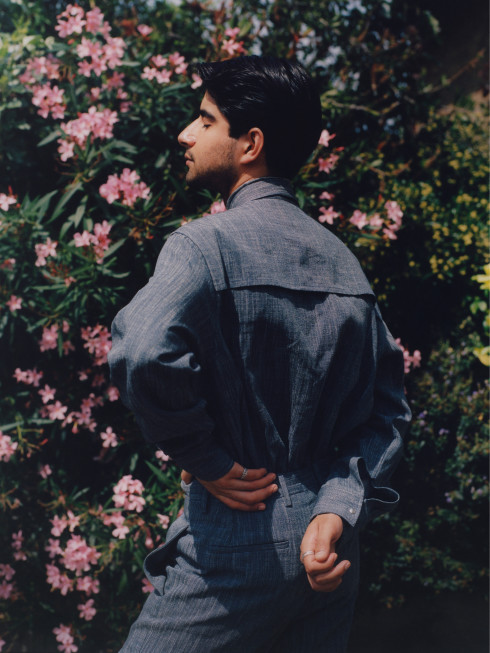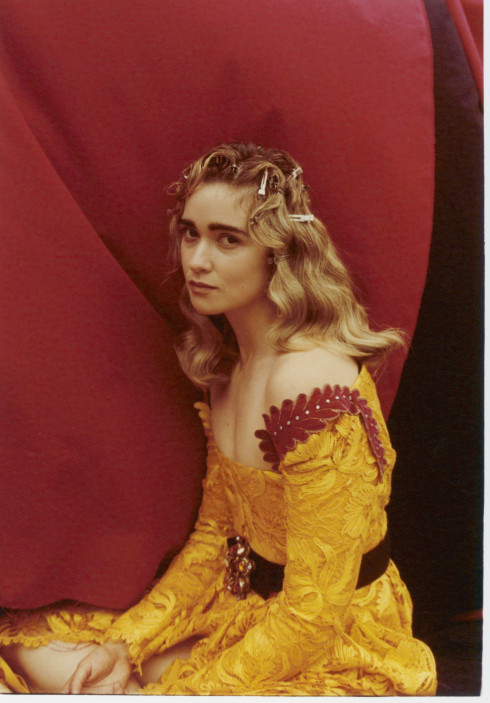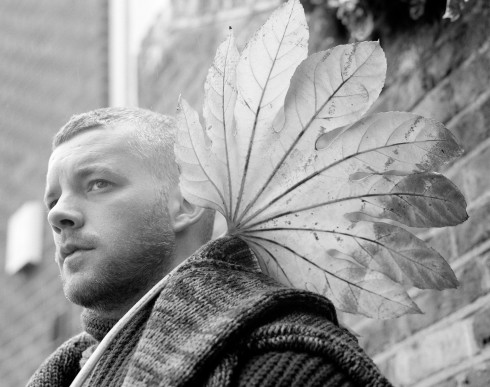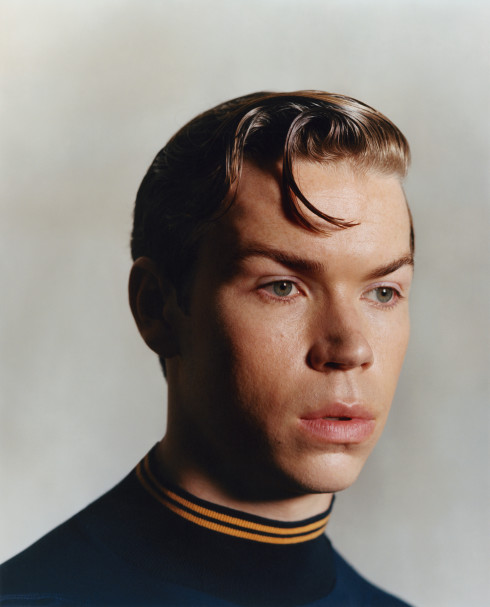
Sweater by Louis Vuitton.
- By
- Jonathan Shia
- Photography by
- John Guerrero
Styling by Olivia Kozlowski. Grooming by Gonn Kinoshita. Photographer’s assistant: Michael Prezioso. Stylist’s assistant: Fraser Horsfall. Digital technician: Casey Showalter.
GIDEON GLICK
It’s been over a decade since the last time the actor Gideon Glick opened a show on Broadway, but he has never been far from the stage in those ten years. After making his début in 2006 at the age of eighteen in Spring Awakening, the revolutionary rock musical from Duncan Sheik that launched the careers of Lea Michele and Jonathan Groff, Glick has been a regular on New York stages, from the Public Theater’s Amy Adams-led revival of Into the Woods for Shakespeare in the Park to new works from rising playwrights Samuel D. Hunter and Tony-winner Stephen Karam—with a quick stop in the ill-fated musical adaption of Spider-Man in between. As he takes the lead role in Significant Other, which opened earlier this month, Glick reflects comfortably on how far he’s come. “I’m glad I’ve had a decade of experience,” he says. “I don’t think I could’ve handled this when I was eighteen. I’m much more confident in my abilities. I think back then I thought maybe this was a fluke and I just got very lucky.”
But anyone who catches Glick in Significant Other will know it’s much more than luck that got him where he is today, starring in a new play that offers a refreshingly contemporary voice on Broadway at just twenty-eight. Written by Joshua Harmon, the show follows the dating life of a young millennial who remains single even as the rest of the cast is paired off in marriage. The premise will be familiar to anyone who has seen a romantic comedy, with the twist that Jordan—played by Glick in a touching, nuanced, and persuasive performance—is gay. And while gay characters are nothing new on the stage, Significant Other takes Jordan’s sexuality as little more than an established detail; the play is not about coming out or dealing with homophobia, but about the individual search for connection. “I felt that I had never read dialogue like that in the theater,” Glick says of the script, which he first performed during the play’s Off Broadway run in 2015. “I felt, ‘Oh, I’ve seen this in film and television, but I’ve never seen a play so accurately depict this age group, like twenty to thirty.’ It was so relatable and so real and that was just energizing. I felt that this is something very, very special.”
As a gay man in the same age group, Glick says that he found many similarities to Joshua, despite being happily partnered up himself. While not autobiographical, the character also pulls from Harmon’s own life, and the connection between actor and playwright over the past few years has helped create a role that finds a balance between them. “I defer to [Harmon] when I have questions, but it’s also my interpretation of his words, so I’m bringing a lot of what I have to bring and I’m not playing him,” Glick explains. “He is drawing from his own experiences and I’m drawing from my own experiences, and we meet somewhere in the middle and that becomes Jordan Berman.”
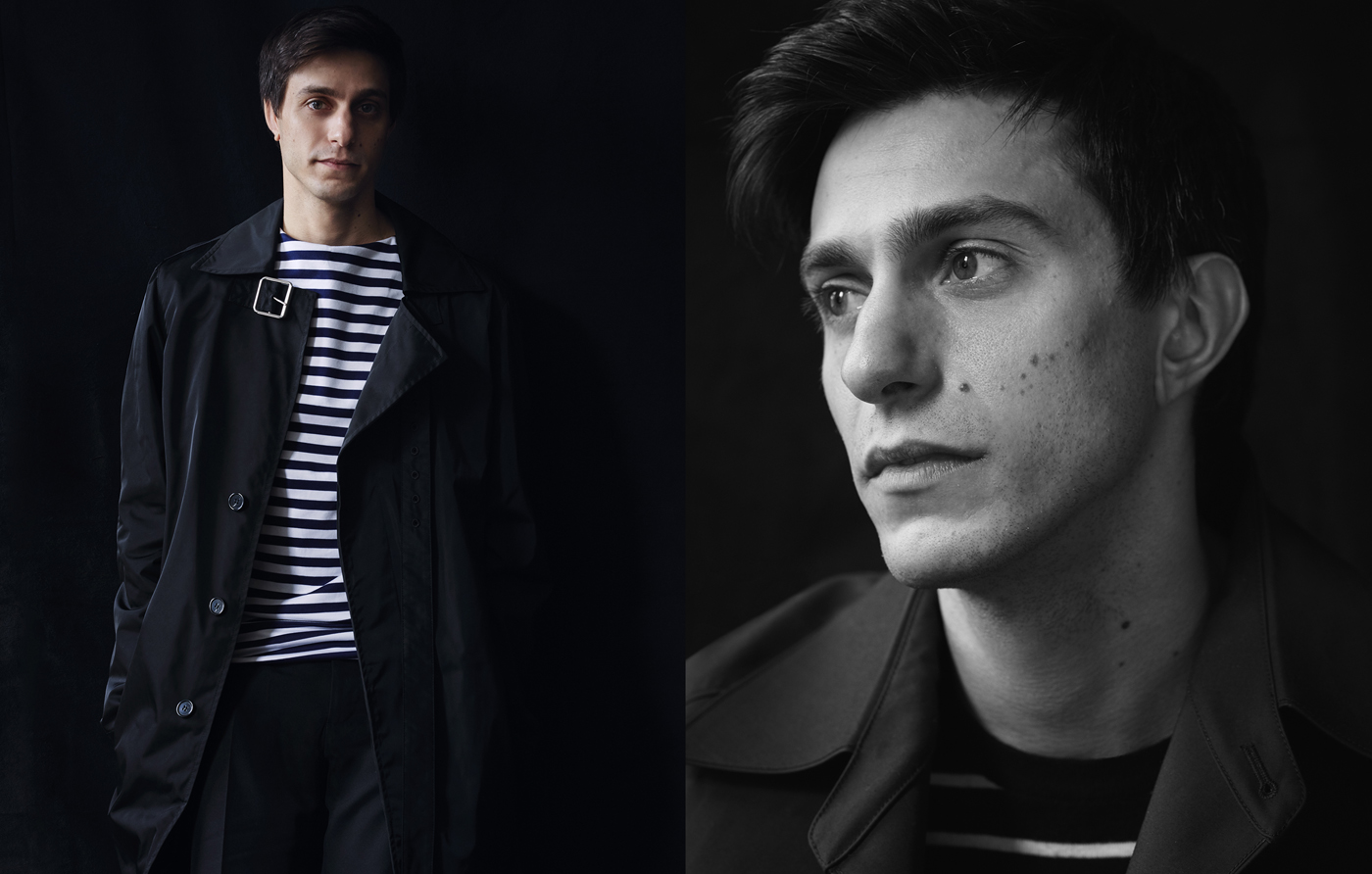
The rare contemporary comedic play on Broadway, Significant Other also draws a unique response from its audience, which skews much younger than usual. In the scene which opens the second act, Jordan deliberates over whether or not to send a rambling email to a romantic prospect, his finger hovering over the Enter button as viewers shout at him in protest. “I think people are getting excited that they see themselves on the stage, which you don’t necessarily see,” Glick says. “You see this exotic ‘other’ a lot and I’m very struck when I go out the stage door and people go like, ‘I feel like I saw myself today,’ or, ‘I felt reflected up there.’ A lot of people are saying it and that’s why I think it’s working.”
Significant Other has a wealth of hilarious and pithy moments, but also a powerful emotional depth, touching on loneliness and anomie in the modern world. Scene changes can require Glick to switch in an instant from tragedy to comedy and back, and he admits that it does take an emotional toll of sorts. “You kind of feel like you’re a cloth being wrung,” he laughs. “In a weird way, it’s cathartic that we’re getting a lot of stuff out, but when the show’s over sometimes it takes me a little bit of time to shake it off. Not too long, but it still lives in your body. You’re visiting it every day and it’s emotionally intense and it’s also a time in my life that’s very exciting, so I think my body is a little freaked out.”
That mix of emotions is in many ways similar to what Glick experienced back when he first started with Spring Awakening. A native of Philadelphia and a lifelong student of the theater, he landed the role of Ernst, a teenager struggling with his sexuality, before graduating from high school, joining a cast composed mostly of actors not yet old enough to drink. “I kind of consider that my conservatory,” he says of the experience. “We were all precocious, talented kids and I think of them as a family.” When the show transferred to Broadway, it was lauded for shifting musical theater in an entirely new direction and turned many of the cast members into some of American theater’s favorite new faces.
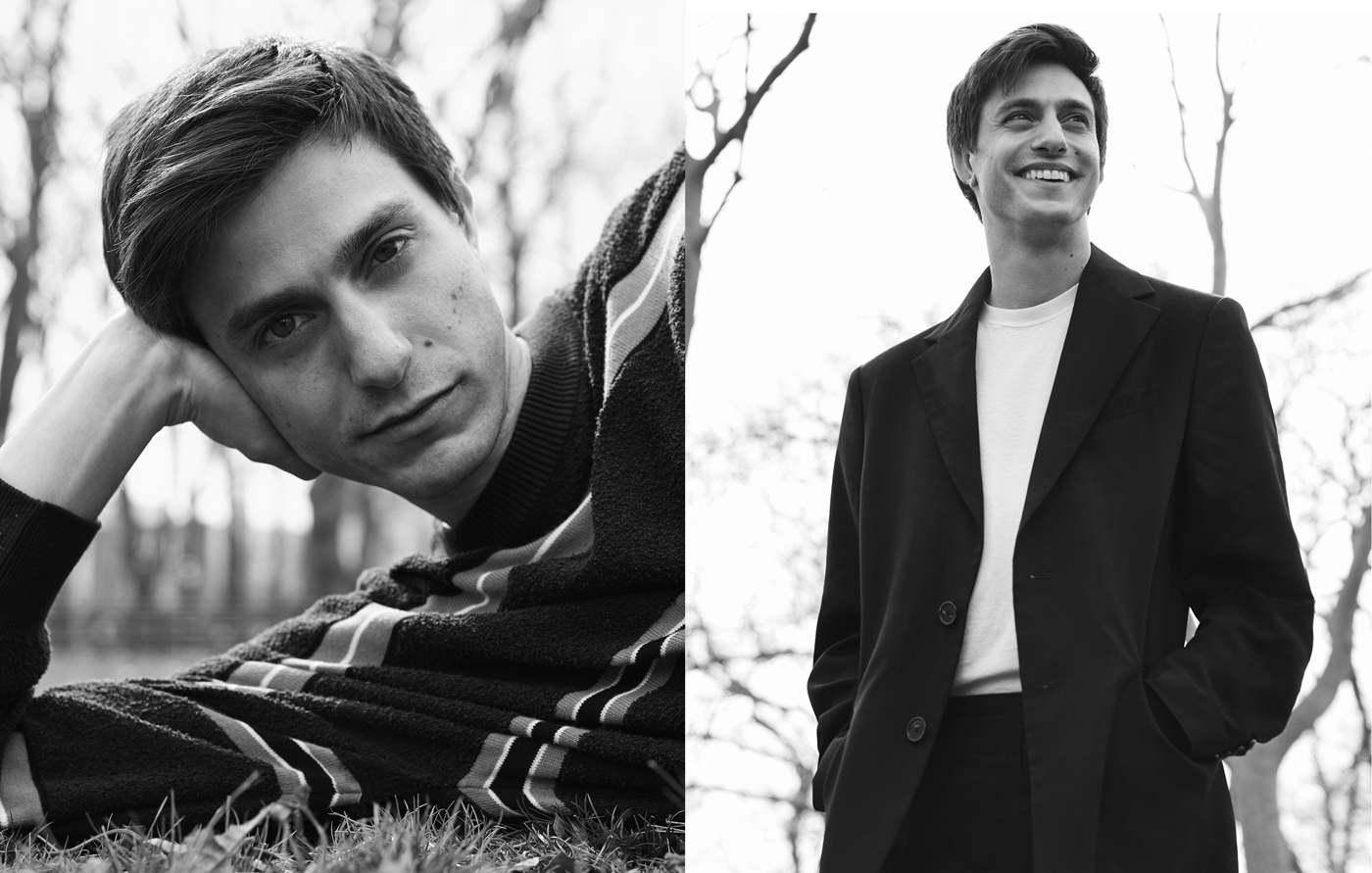
Glick was the first original cast member to leave Spring Awakening, taking a part in Karam’s play Speech & Debate and enrolling at NYU to study art history, eventually graduating eight years later after taking a series of breaks to perform. Over the years, he has appeared in an impressive string of new works by emerging playwrights, including in Thomas Higgins’s Wild Animals You Should Know, as a Boy Scout with a twisted relationship with a friend played by Jay Armstrong Johnson, and in Samuel D. Hunter’s The Few, about the impassioned staff of a dying newspaper for long-haul truckers, and The Harvest, as a young evangelical preparing for a mission. “I’ve only done one revival, so I’ve only done new work, so it’s the only thing I actually do know how to do,” he laughs. “But being part of the ground up with the collaborators, you feel like you’re contributing to the material. I’ve been really fortunate that the writers and directors I’ve worked with are very collaborative, so you start to speak the same language and you have this mutual trust and there’s a symbiosis that happens in terms of creating the piece and you just feel a part of it.”
As with many theater actors today, Glick has also shot a number of films and television shows, although he still considers himself a “theater baby.” He appeared alongside Anne Hathaway and Johnny Flynn in the music-centric Song One in 2015 and will be seen later this year in the film adaptation of Speech & Debate and next year in a small role in Ocean’s Eight, but he says he will always consider the stage his home. “When I started, I didn’t really think of film and television—it was always theater,” he says. “As I’ve gotten older, I like film and television a lot, but I’m more accustomed to theater. I think theater is this beautiful, special thing that I never want to not have as a part of my life.” Given the progress of Glick’s career so far, that shouldn’t be too difficult to achieve.
Significant Other is now playing at the Booth Theatre, 222 West 45th Street, New York.
- By
- Jonathan Shia
- Photography by
- John Guerrero
Styling by Olivia Kozlowski. Grooming by Gonn Kinoshita. Photographer’s assistant: Michael Prezioso. Stylist’s assistant: Fraser Horsfall. Digital technician: Casey Showalter.
